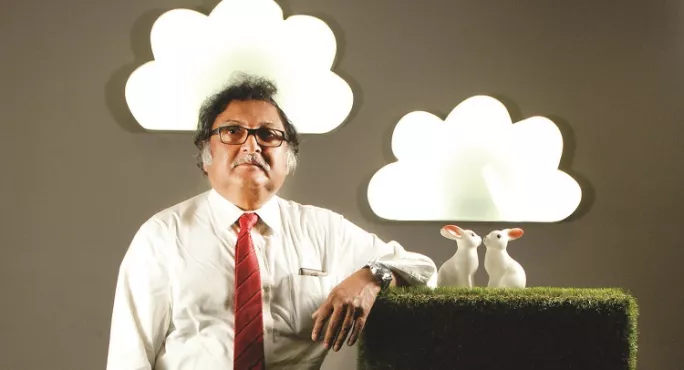- Home
- Teaching & Learning
- Secondary
- Sugata Mitra: PhD-style vivas should replace exams
Sugata Mitra: PhD-style vivas should replace exams

Sugata Mitra, professor emeritus at NIIT University Rajasthan, thinks we need a radical overhaul of the way that we assess children. And he’s getting his inspiration from an unlikely place: PhD vivas.
After all, he says, in a world where a child can learn anything using the smartphone in their pocket, we should not be testing them on their ability to recall information but their ability to find something out, and communicate their findings.
“We need to measure the three general topics in today’s world: comprehension, communication and computing skills,” he says, talking to Tes at the World Education Summit:
“I’m adding computing because these children live with that. For them, answering a question means being able to use your phone.
“If we measured those three, it doesn’t matter how good the child is at physics or history because I know the child can pick up what he needs to know, when he needs to know it.”
And he belives the PhD viva offers a perfect model to do just that.
Assessment: The case for PhD-style vivas in schools
This is a radical idea, but then Mitra is known for pushing the boundaries and experimenting with what education can look like.
His most famous idea was his “hole-in-the-wall” experiment at NIIT in the late 1990s, where he knocked through a wall of his office adjoining a slum and placed a computer there for local children to use.
That inspired the novel Q&A, which became the film Slumdog Millionaire. Later, Mitra won a TED prize in 2013 for his proposal to build “a school in the cloud”.
Now he is looking at assessment and the idea of PhD-style vivas, where candidates are invited to discuss their doctoral research with a panel of experts, which, he says, could hold the key to finally changing our long-held approach to assessment.
“It’s the best thing we have, the PhD,” he says. “Why don’t we move that down to nine-year-olds? Is there something that stops us from respectfully asking a nine-year-old what they know? As opposed to saying, ‘Sit down over there’? Don’t look left. Don’t look right.”
Furthermore, he argues this radical approach would be better served by continuous assessment, rather than a single set of one-off exams, because these can be affected by so many things like the state of a student’s health or their mind.
“Why should those couple of hours affect a student’s life so much?” Mitra asks.
He adds also that the scoring of exams is questionable, too: “Where you get 69 and I get 67, so I’m two points less clever than you. That doesn’t make any sense at all.”
Would it work?
But how would such a viva system actually work in practice?
Well, Mitra says that when it comes to backing up the judgement of individual teachers in a viva, there should be a system of cross-checking, using statistics to check the broad distribution of marks that a teacher gives out.
This could also protect against any unconscious bias that a teacher might have towards a student, he says. “I’m of the opinion that we should follow the structure of how PhDs are dictated, how medical diagnosis is done,” he explains. “It’s usually based on a person’s judgement, cross-checked by other people.
“It’s only for machines that we would plug into electrodes and say, ‘Is the current exactly what it should be?’ You can’t measure a person’s mind like that.”
Changing the status quo
Of course, there are significant obstacles to these ideas being implemented in greater numbers - not least the fact that there is still work to be done on building an evidence base for Mitra’s ideas, as he readily admits himself.
“There’s a lot of thinking to be done, a lot of trials to be done,” Mitra says. “I don’t have all the answers.”
And perhaps a more profound challenge is the risk attached to abandoning an assessment system that we have used for years - something he admits is easy to talk about when he is not the one actually being called on to make the change.
“If I were an education minister and somebody said, ‘Put your money where your mouth is and do it,’ I would be more scared.”
Nonetheless, Mitra is adamant that viva-style assessment would work in practice, and could be more accurate than the current options:
“If you are a teacher, you know your student better than anyone on this planet, including their parents,” he argues.
“If such a teacher talks to me for three minutes, she can make a score and that score will be spot on. It will be better than the tick marks on the answer book.”
Sugata Mitra was talking to Adi Bloom at the World Education Summit, at which Tes was the media partner. This article was written by Jacob Moreton, a freelance journalist based in Cardiff
You need a Tes subscription to read this article
Subscribe now to read this article and get other subscriber-only content:
- Unlimited access to all Tes magazine content
- Exclusive subscriber-only stories
- Award-winning email newsletters
Already a subscriber? Log in
You need a subscription to read this article
Subscribe now to read this article and get other subscriber-only content, including:
- Unlimited access to all Tes magazine content
- Exclusive subscriber-only stories
- Award-winning email newsletters
topics in this article



